Ishii wins showdown with Morikawa for 68kg gold; Kinjo claims 59kg crown
Friday, December 23, 2022 - 12:50 By Ken Marantz

TOKYO (December 23) -- Already a world silver medalist, Ami ISHII picked up her first national title at women's 68kg with a dramatic victory over world 65kg champion Miwa MORIKAWA, while two-time Olympic champion Risako KINJO was content with a title in a non-Olympic weight as she transitions back to the mat from childbirth.
Ishii denied Morikawa in her bid to move up to the Olympic weight class, scoring all of her points in the second period for a 5-2 victory in the final at the Emperor's Cup All-Japan Championships on Friday in Tokyo.
Kinjo, who plans to make a run for her third Olympic gold at the 2024 Paris Games at 57kg, forged out a 4-1 victory over former world U23 champion Yui SAKANO in the 59kg final in the tournament that is serving as the first domestic qualifier for next year's World Championships in Belgrade.
Meanwhile, Rei HIGUCHI and Sae NANJO both avenged losses to old nemeses in reaching the final of their respective weight classes, while Tokyo Olympic champion Yui SUSAKI, well, just did what Yui Susaki always does.

The Ishii-Morikawa clash came about due to the fact that the tournament has implications on qualifying for the Paris Olympics. Combined with the Meiji Cup All-Japan Invitational Championships in June, it helps determine the team to Belgrade, where a medal by a Japanese wrestler in an Olympic weight will mean an automatic place in Paris.
To better prepare the wrestlers for the worlds and Olympics, the format of the four-day tournament has been tweaked so that the Olympic weights are run over two days, while the non-Olympic classes are started and finished in one day.
Ishii moved a step closer to Paris by emerging victorious in a field that included four current or past world medalists and two former U20 world champions.
"When the buzzer sounded, I was really happy," said Ishii, who also picked up the world U20 gold this year. "But when I look at it calmly, this match was the first in the qualifying process, it didn't decide the Olympics. It's just a point along the way."
Morikawa, who missed out on the Tokyo Olympics when she lost a playoff for the 68kg spot to Sara DOSHO, took the lead in the final with a spin-behind takedown off an Ishii shot in the first period. In the second period, Ishii tied it with a single-leg takedown.
As Morikawa tried to press for a stepout, her strength was not enough against the rock-solid Ishii, who reversed the roles and forced Morikawa out. Ishii stuffed a last-ditch lateral drop attempt in the final seconds for her final points.
"The first two points I gave up, I started the attack and she scored off my mistake," Ishii said. "To tie the match, I went with my regular single. At 2-2, there was still a lot of time left, but I didn't want to just keep defending and I kept on the attack."
It was a major blow for Morikawa, who won the 68kg title in 2019 before winning consecutive crowns at 65kg in 2020 and 2021.
"At 65kg, I often press ahead to get stepout points," Morikawa said. "But she held me off and I couldn't get her out. I have to get [my strength] to the level of this weight class."

For the 28-year-old Kinjo, who won her Olympic golds and three world titles under her maiden name of KAWAI, the road ahead goes the opposite direction, as she will be returning to 57kg for the Meiji Cup.
Kinjo got married soon after the Tokyo Olympics -- to a fellow wrestler, of course -- and gave birth to her first child, a girl, in May. She returned to competition in October at the second-tier All-Japan Women's Open, where she won the 59kg title.
While her mother and others help with the childcare, Kinjo finds she must budget her time, which means quality over quantity when it comes to practice. But it makes her more appreciative of being able to still compete in the sport she loves.
"On days that I practice, putting on the shoes and taking the mat for a hard workout is tough, but just that alone is pleasureable and I can feel that wrestling is still fun," she said.
In contrast to her credentials, Kinjo did not have an easy time on Friday. In her opening match in the quarterfinals against collegian Natsuki YAMAGUCHI, she received an activity point just before giving up a takedown, then held on for a 3-2 victory.
"I'm usually tight in the first match," Kinjo said. "Even if it's only one point, I have more experience than the others, so it may seem like a little, but I think it's big. After the first match, I make changes that I need to make."
The most surprising aspect of the victory was the fact that Kinjo was not aware it had been five years since she won her last Emperor's Cup title. Since then, she came out on the short end of a classic battle with the legendary Kaori ICHO in 2018, then skipped the tournament the next three years.

Meanwhile, there was no outburst of joy like that of one of the youngest participants in the tournament, as world U20 champion Ayano MORO's victory in the women's 76kg final left the high schooler wailing in tears on the medal podium.
Moro, making her debut in a senior level tournament, scored a takedown with 20 seconds left to take a three-point lead, then held on for a 4-3 victory over Nodoka YAMAMOTO, who opened some eyes by winning both of her matches at the recent World Cup.
The 17-year-old Moro, a junior at Tokyo's Abe Gakuin High School, has not lost since November 2017, a span that includes a victory at the U20 World Championships in August this year in Sofia, Bulgaria, as she looks to fill the opening at the heaviest weight class once dominated by world medalists Kyoko HAMAGUCHI and Hiroe MINAGAWA.
In other action, Daichi TAKATANI combined with older brother Sohsuke for a sibling double for the second year in a row and third time overall when he defeated Kirin KINOSHITA 5-2 in the freestyle 74kg final.
Takatani scored with a front headlock roll late in the first period, then added a second-period takedown to defeat Kinoshita for his third career title. He still has a way to catch up to Sohsuke, who notched his 12th straight title on Thursday with a victory at 92kg.

Susaki cruises into final
Susaki, coming off her historic win at the world U23 two months ago, advanced to the women's 50kg final with an 11-0 technical fall over Nanami IRIE, the 2019 world silver medalist at 55kg.
The current world champion set up a clash for the gold with Remina YOSHIMOTO, the 2021 world champion in Susaki's absence and has lost all four previous encounters between the two, including the final of this year's Meiji Cup.
The 23-year-old Susaki moved into another stratosphere with her victory at the world U23 in Pontevedra, Spain, as it made her the first wrestler in history to complete the Grand Slam of Olympic gold and all four age-group titles. It also came a month after she captured her third senior world gold.
While Susaki disposed of one Irie sister in gaining a chance for her third career Emperor's Cup title and first since 2019, she was relieved of the burden of facing another one with whom she is much more familiar.
Yuki TANAKA, who remains the only wrestler on the planet to have beaten Susaki from her junior high school days, was ousted in her quarterfinal match by Hanano SAKURAI, the younger sister of 57kg world champion Tsugumi SAKURAI, who used a nifty barrel roll twice to score a 7-0 victory.
Tanaka, the oldest of the three Irie wrestling sisters, had stepped away from the sport when she failed to get to the Tokyo Olympics. Newly married, she only returned to competition in July this year.
"The level [of opponents] has gotten higher, and I haven't reached that yet," said Tanaka, who defeated Susaki three times in her career but eventually lost out to her for a place at the Tokyo Olympics. "I didn't wrestle for two years. Of course, I wanted to win the title, but I had a stronger feeling of just taking each and every match one at a time."

Higuchi, who won the world gold at 61kg this year, made a successful start in his drop back down to 57kg, the weight class in which he won the silver medal at the 2016 Rio Olympics.
On Friday, Higuchi advanced to the final with an 11-0 technical fall over former world champion Yuki TAKAHASHI, avenging a devastating loss to the Yamanshi Gakuin University coach in a playoff for a spot at the Tokyo Olympics.
Higuchi used an effective single-leg attack to score three takedowns, two of which he punctuated with gut wrenches with the last one ending the match at 3:43.
For Higuchi, the biggest problem at 57kg has been weight control, as he famously failed to make weight at the Asian Olympic qualifying tournament to open the door back up for Takahashi to gain the ticket to the Tokyo Olympics.
Higuchi refused to speak to the press after his win, saying he needed to focus on doing what he needs to do to make weight on Saturday.

Nanjo made it third-time-lucky in her encounters with Tsugumi Sakurai, making the women's 57kg final by finally protecting a lead after twice seeing the Ikuei University star score a last-second victory over the past year.
Nanjo jumped out to a 5-0 lead in the first period with a takedown, penalty point and lace lock, then held on for a 5-4 win after Sakurai scored two takedowns in the second but couldn't manage to turn her over.
"In the first period, I allowed her to easily get to my legs and after that, to turn me on the ground, so it put me in a tough five-point deficit," Sakurai said.
"My style is to fight the full six minutes and put it on the line in the second period. But I had a tough match in the quarterfinals, so I started getting tired. My opponent stayed tough and I couldn't pull out the win."
In the final at last year's Emperor's Cup, Sakurai seized the title with a four-point takedown in the final seconds for a 5-2 victory over Nanjo. Then, at this year's Meiji Cup it was deja vu all over again as Sakurai scored a buzzer-beating takedown for a 5-3 win.
In going for her fifth career title and first since 2020, Nanjo will next face Sara NATAMI, who pulled off a late victory by fall over Umi IMAI in the other semifinal, a battle of reigning Asian champions.
Natami was trailing 2-1 in the last minute when she used a front headlock roll to put Imai on her back and secured the fall at 5:31. Natami won the 59kg title at this year's Asian Championships, while Imai took home the 55kg gold.

Another big name to fall was Tokyo Olympic bronze medalist Shohei YABIKU, who was ousted in the Greco 77kg quarterfinals by collegiate champion Nao KUSAKU, with whom he trains at his alma mater Nippon Sports Science University.
Kusaku, a world U23 bronze medalist this year, led on criteria with the second of two passivity points handed out, then held on when placed on the bottom in par terre in the second period for a 1-1 victory.
Yabiku has been battling recent knee and other injuries since placing second at the Wladyslaw Pytlasinski Cup in Poland in July and made an early exit at the World Championships in Belgrade.
"It can't be said I'm in the best condition, but as long as I'm taking the mat, I'm thinking of winning, so I don't want that to be an excuse," Yabiku said.
Yabiku had two chances on top in par terre, but he was unable to execute the spectacular throws that he rode to an eye-opening run to the bronze medal at the Tokyo Olympics.
"What I mostly rely on was stopped," Yabiku said. "We practice together every day, so he knows me very well. The big reason for the loss was my ground attack. I'm confident I can defend on the ground, but the offense has become a source of anxiety. Bad things come out in me."
Meanwhile, Taishi NARIKUNI's bold quest to become the first wrestler in 49 years to pull off a freestyle-Greco double at the All-Japan never got started, as the world freestyle 70kg champion withdrew due to a broken rib suffered in practice.
Narikuni, who was entered at both freestyle 70kg and Greco 67kg, suffered the injury about a month ago, but only had it diagnosed last week after he continued to feel pain, according to a Facebook post by Narikuni's mother, a former two-time world champion.
Another less-heralded wrestler who was attempting the same feat, collegian Akito MUKAIDA, also withdrew due to injury. Mukaida is the younger brother of Olympic champion Mayu SHIDOCHI.
Results
Freestyle
57kg (11 entries)
Semifinal - Rikuto ARAI df. Ryuto SAKAKI, 5-4
Semifinal - Rei HIGUCHI df. Yuki TAKAHASHI by TF, 10-0, 3:43
74kg (14 entries)
Gold - Daichi TAKATANI df. Kirin KINOSHITA, 5-2
Bronze - Kojiro SHIGA df. Jintaro MOTOYAMA by TF, 10-0, 1:28
Bronze -Kota TAKAHASHI df. Ryutaro TOGIYA by TF, 10-0, 1:53
86kg (14 entries)
Semifinal - Hayato ISHIGURO df. Taisei MATSUYUKI, 4-3
Semifinal - Yudai TAKAHASHI df. Fumiya IGARASHI, 5-1
97kg (10 entries)
Gold - Takashi ISHIGURO df. Hibiki ITO by TF, 13-1, 5:51
Bronze - Shohei YAMAZAKI df. Toyoki HAMADA, 3-1
Bronze - Hiroto NINOMIYA df. Keiwan YOSHIDA by Def.
125kg (10 entries)
Gold - Daiki YAMAMOTO df. Ryusei FUJITA by TF, 12-0, 1:31
Bronze - Nozomi OISHI df. Takuya HIGUCHI by Def.
Bronze - Yuji FUKUI df. Kai SHUTTO, 3-0
Greco-Roman
63kg (16 entries)
Gold - Machiezo MARUYAMA df. Ryuto IKEDA, 6-1
Bronze - Kenshin MATSUMOTO df. Ryotaro FUJINAMI by Def.
Bronze - Yamato HAGIWARA df. Komei SAWADA, 7-1
Semifinal - Ryuto IKEDA df. Ryotaro FUJINAMI by TF, 8-0, 1:51
Semifinal - Machiezo MARUYAMA df. Komei SAWADA, 5-3
67kg (13 entries)
Semifinal - Katsuaki ENDO df. Haruto YABE, 5-5
Semifinal - Kyotaro SOGABE df. Shigeki TSUTSUMI by TF, 9-0, 2:01
77kg (13 entries)
Semifinal - Nao KUSAKA df. Tatsuya FUJII, 5-1
Semifinal - Kodai SAKURABA df. Minto MAEDA, 8-6
87kg (10 entries)
Gold - Masato SUMI df. So SAKABE, 5-1
Bronze - Yuto MATSUZAKI df. Daisei ISOE by TF, 9-0, 1:55
Bronze - Yoji KAWAMURA df. Kaito MIYAMOTO by Def.
97kg (11 entries)
Gold - Yuta NARA df. Masayuki AMANO, 3-0
Bronze - Yuri NAKAZATO df. Kairi YOSHIMURA by TF, 10-0, 4:09
Bronze - Riku NAKAHARA df. Kyo KITAWAKI by TF, 8-0, 4:07
130kg (10 entries)
Gold - Sota OKUMURA df. Shion OBATA, 3-3
Bronze - Daigo NISHI df. Koei YAMADA, 1-1
Bronze - Ryuta KONO df. Naoto YAMAGUCHI, 3-1
Women
50kg (16 entries)
Semifinal - Yui SUSAKI df. Nanami IRIE by TF, 11-0, 2:47
Semifinal - Remina YOSHIMOTO df. Hanano SAKURAI by Fall, 3:57 (10-0)
57kg (10 entries)
Semifinal - Sae NANJO df. Tsugumi SAKURAI, 5-4
Semifinal - Sara NATAMI df. Umi IMAI by Fall, 5:31 (3-2)
59kg (15 entries)
Gold - Risako KINJO df. Yui SAKANO, 4-1
Bronze - Akie HANAI df. Natsuki YAMAGUCHI, 6-5
Bronze - Miyu NAKANISHI df. Nana IKEHATA by Fall, 3:54 (2-1)
Semifinal - Risako KINJO df. Akie HANAI, 5-0
Semifinal - Yui SAKANO df. Miyu NAKANISHI by TF, 11-0, 5:51
68kg (9 entries)
Gold - Ami ISHII df. Miwa MORIKAWA, 5-2
Bronze - Rin MIYAJI df. Naruha MATSUYUKI by TF, 10-0, 3:27
Bronze - Miyu IMAI df. Yui ISAKI by TF, 10-0, 1:10
72kg (8 entries)
Gold - Sumire NIIKURA df. Kanon KOBAYASHI, 7-5
Bronze - Yawara SHIOSAWA df. Mei SHINDO, 3-0
Bronze - Misaki WACHI df. Nana SAKAMOTO by TF, 10-0, 2:45
Semifinal - Sumire NIIKURA df. Mei SHINDO, 4-0
Semifinal - Kanon KOBAYASHI df. Misaki WACHI, 6-3
76kg (7 entries)
Gold - Ayano MORO df. Nodoka YAMAMOTO, 4-3
Bronze - Mizuki NAGASHIMA df. Nanaha TAKASU, 4-0

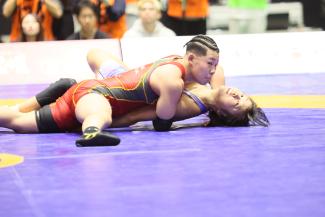
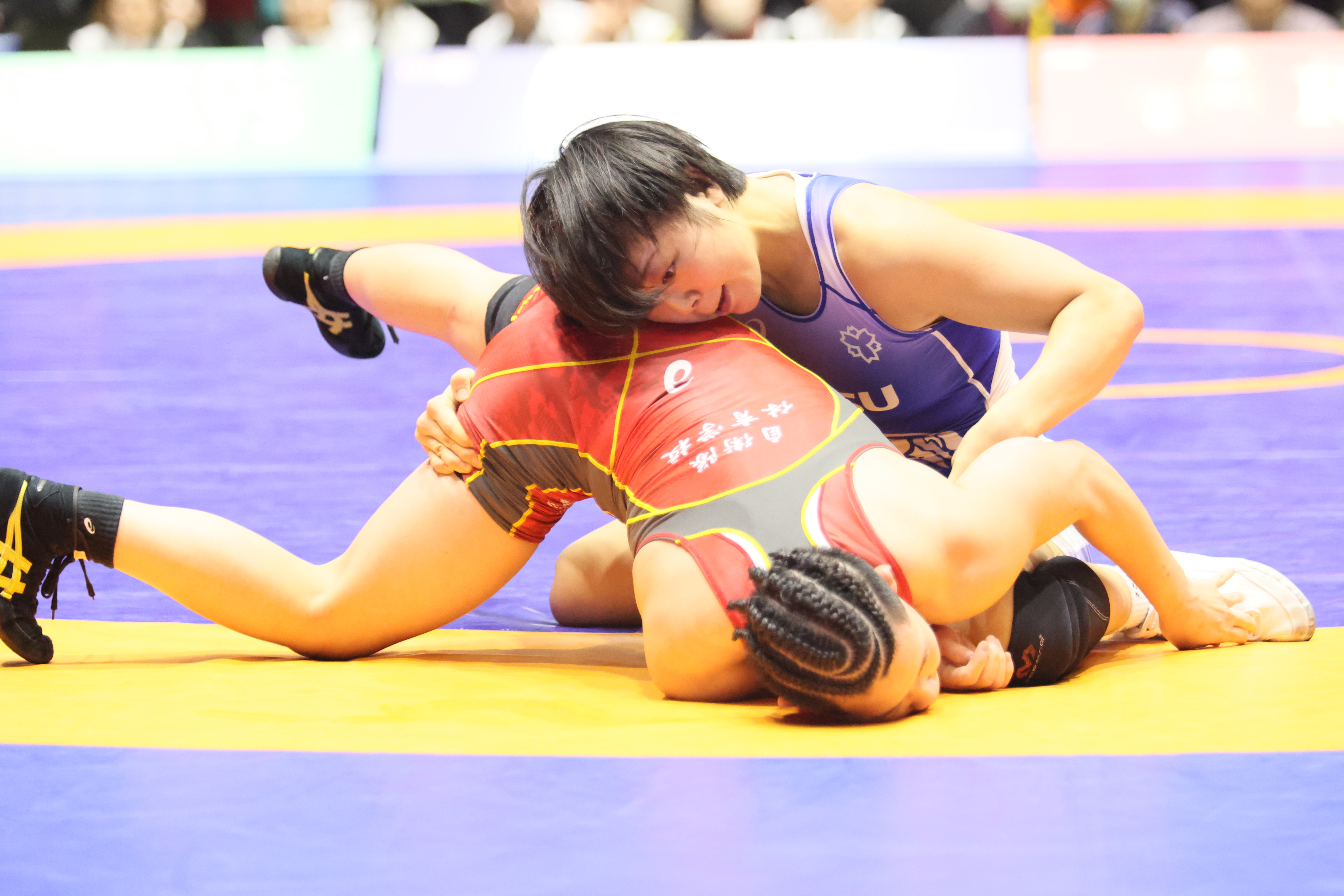 Akari FUJINAMI finishes up the winning takedown against Himeka TOKUHARA in the final minute of the women's 57kg final. (Photo: Takeo Yabuki / wrestling-spirits.jp)
Akari FUJINAMI finishes up the winning takedown against Himeka TOKUHARA in the final minute of the women's 57kg final. (Photo: Takeo Yabuki / wrestling-spirits.jp)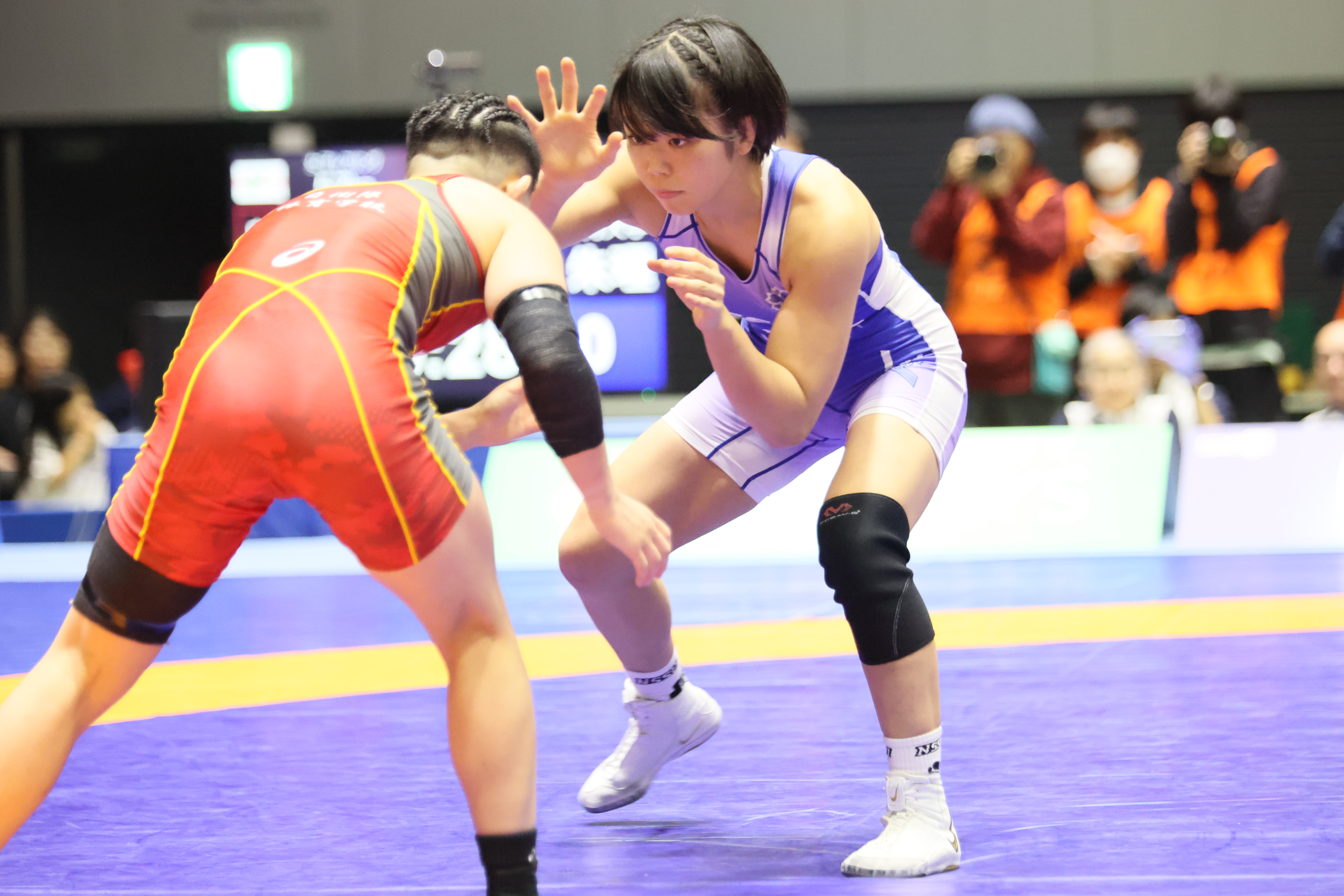 Akari FUJINAMI squares off with Himeka TOKUHARA in the women's 57kg final. (Photo: Takeo Yabuki / wrestling-spirits.jp)
Akari FUJINAMI squares off with Himeka TOKUHARA in the women's 57kg final. (Photo: Takeo Yabuki / wrestling-spirits.jp)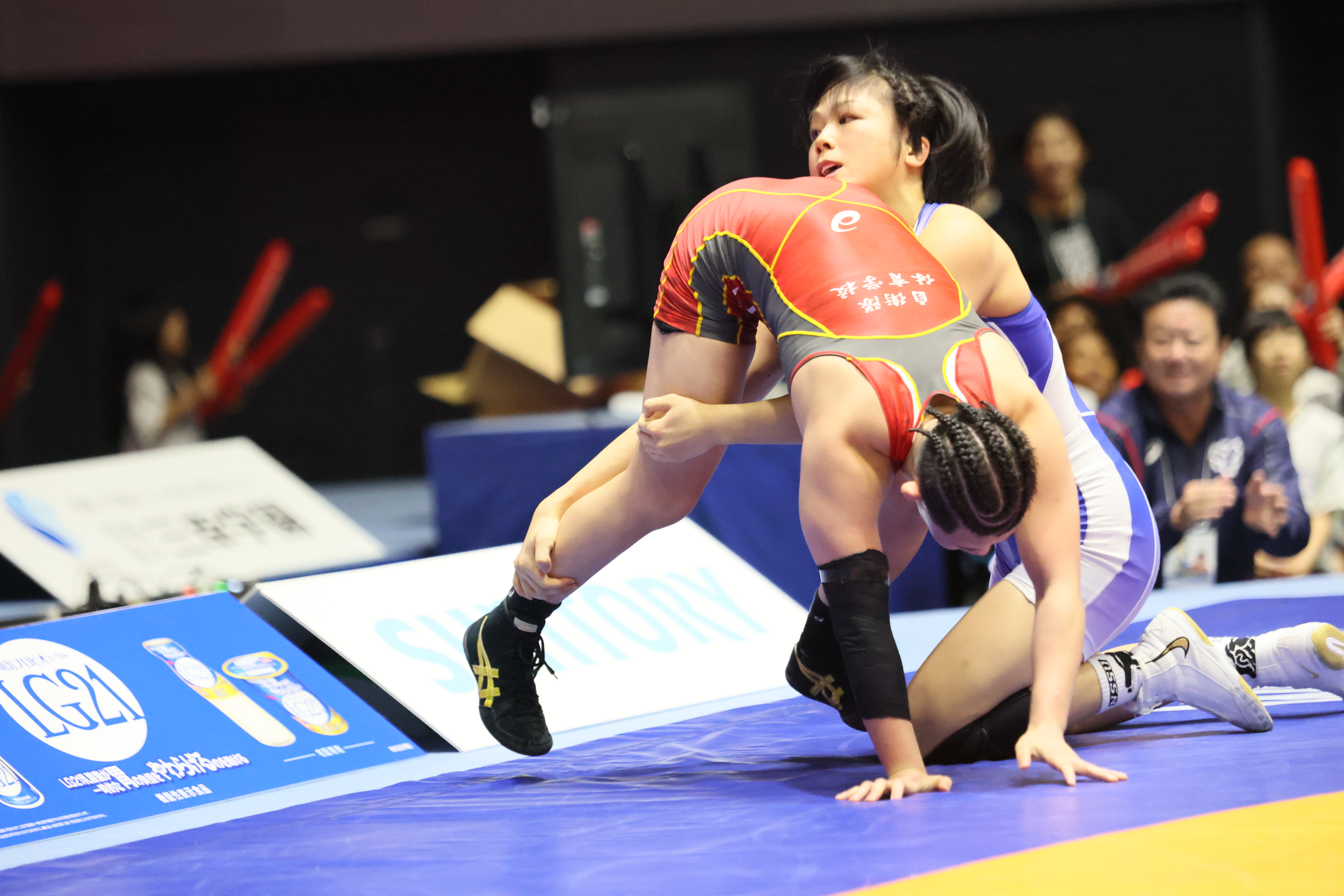 Akari FUJINAMI gets a stepout in the second period of the women's 57kg final. (Photo: Takeo Yabuki / wrestling-spirits.jp)
Akari FUJINAMI gets a stepout in the second period of the women's 57kg final. (Photo: Takeo Yabuki / wrestling-spirits.jp)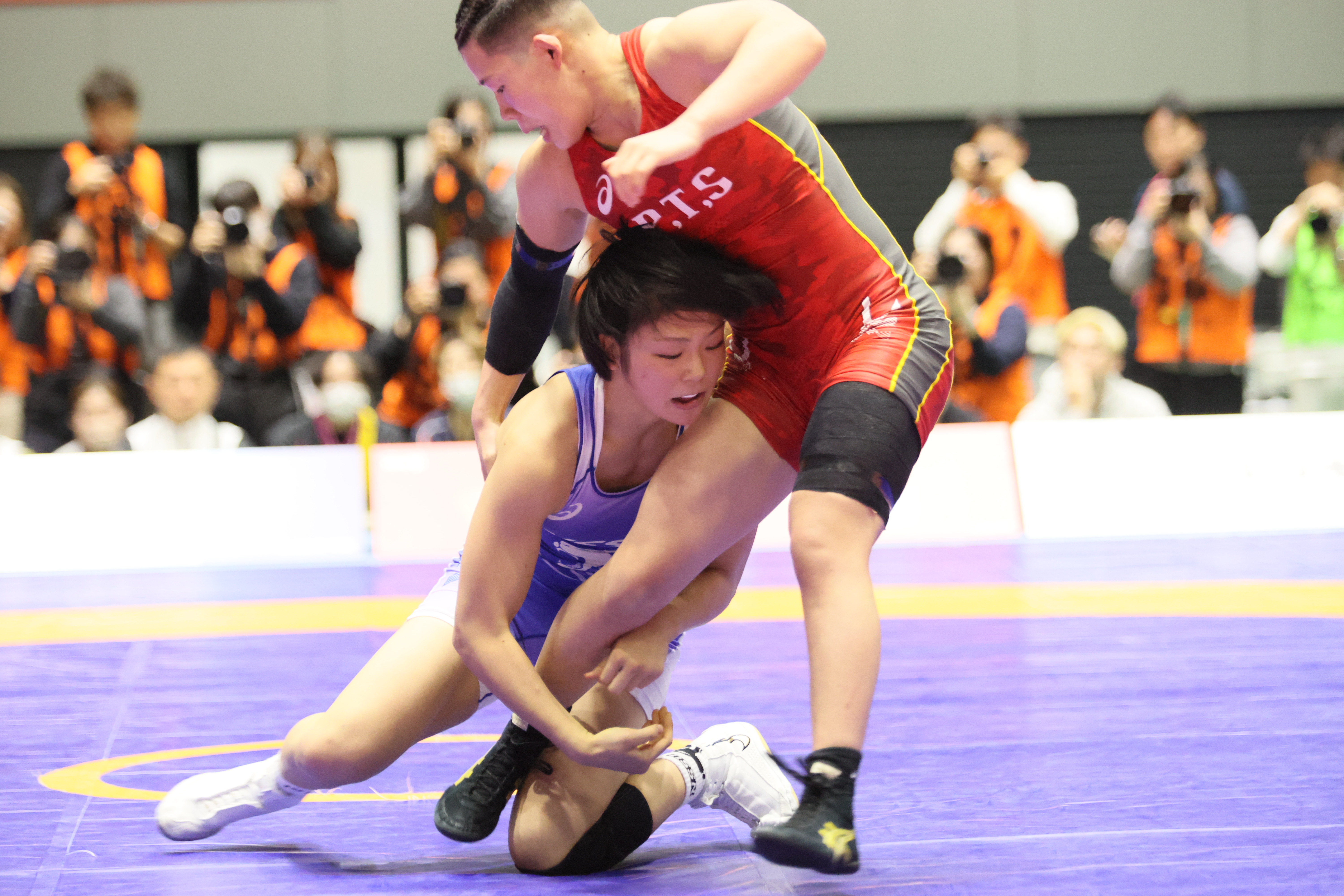 Akari FUJINAMI shoots for the winning takedown against Himeka TOKUHARA in the final minute of the women's 57kg final. (Photo: Takeo Yabuki / wrestling-spirits.jp)
Akari FUJINAMI shoots for the winning takedown against Himeka TOKUHARA in the final minute of the women's 57kg final. (Photo: Takeo Yabuki / wrestling-spirits.jp)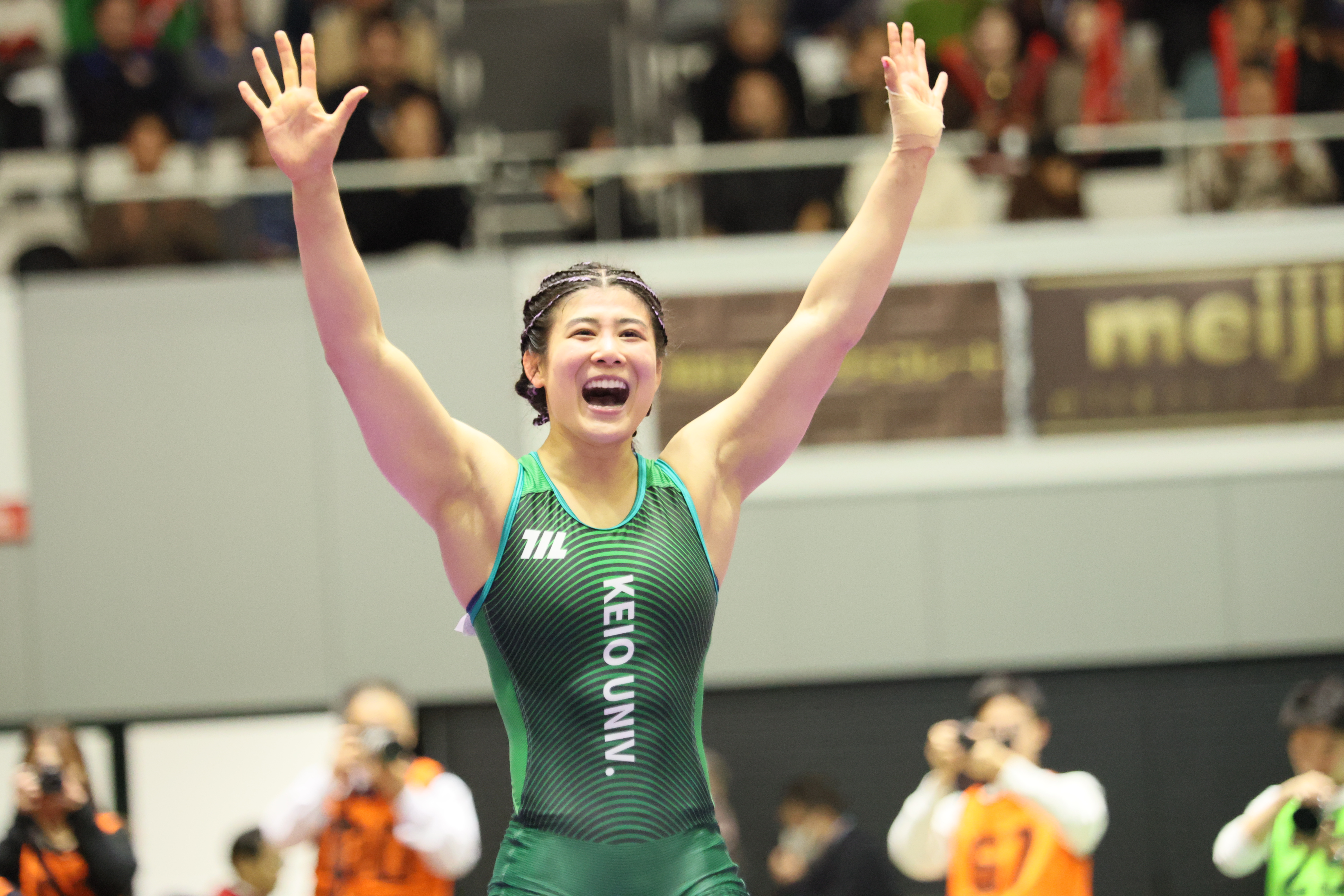 Nonoka OZAKI celebrates her victory over nemesis and Olympic champion Sakura MOTOKI in the women's 62kg final. (Photo: Takeo Yabuki / wrestling-spirits.jp)
Nonoka OZAKI celebrates her victory over nemesis and Olympic champion Sakura MOTOKI in the women's 62kg final. (Photo: Takeo Yabuki / wrestling-spirits.jp)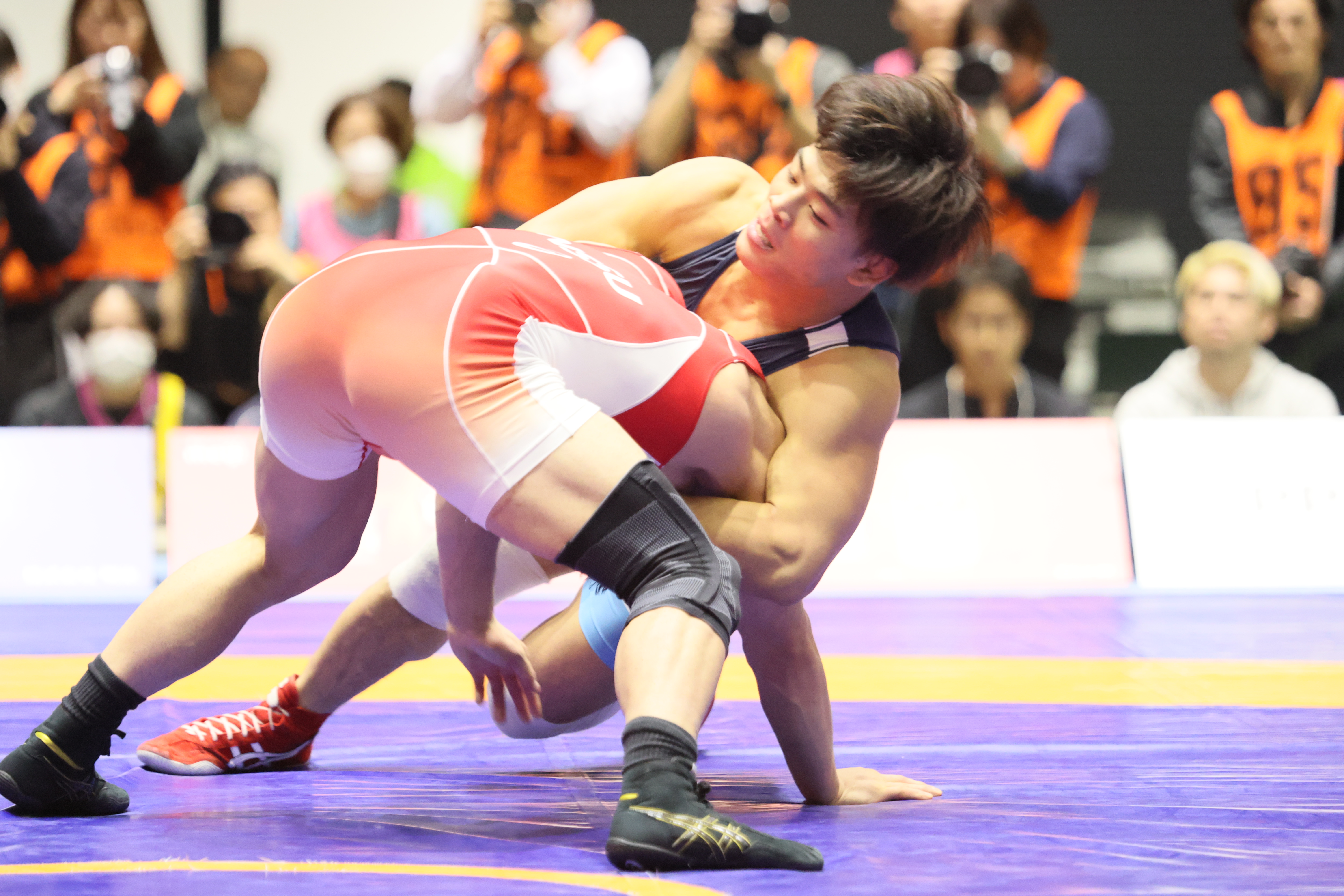 Yoshinosuke AOYAGI unsuccessfully attempts a front body lock roll in the freestyle 74kg final against Kota TAKAHASHI. (Photo: Takeo Yabuki / wrestling-spirits.jp)
Yoshinosuke AOYAGI unsuccessfully attempts a front body lock roll in the freestyle 74kg final against Kota TAKAHASHI. (Photo: Takeo Yabuki / wrestling-spirits.jp)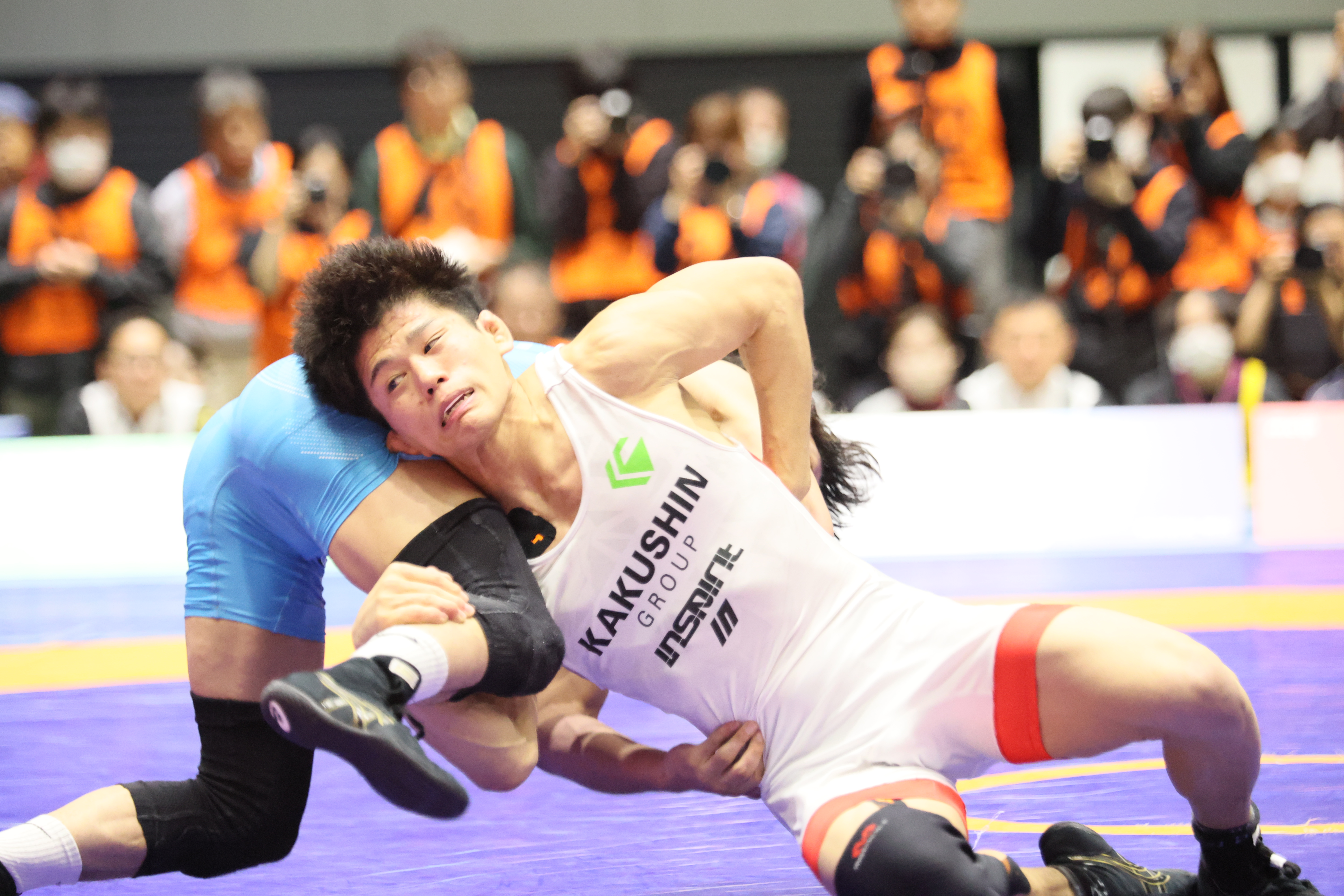 Kotaro KIYOOKA sweeps to the side for a takedown against Takara SUDA in the freestyle 65kg final. (Photo: Takeo Yabuki / wrestling-spirits.jp)
Kotaro KIYOOKA sweeps to the side for a takedown against Takara SUDA in the freestyle 65kg final. (Photo: Takeo Yabuki / wrestling-spirits.jp)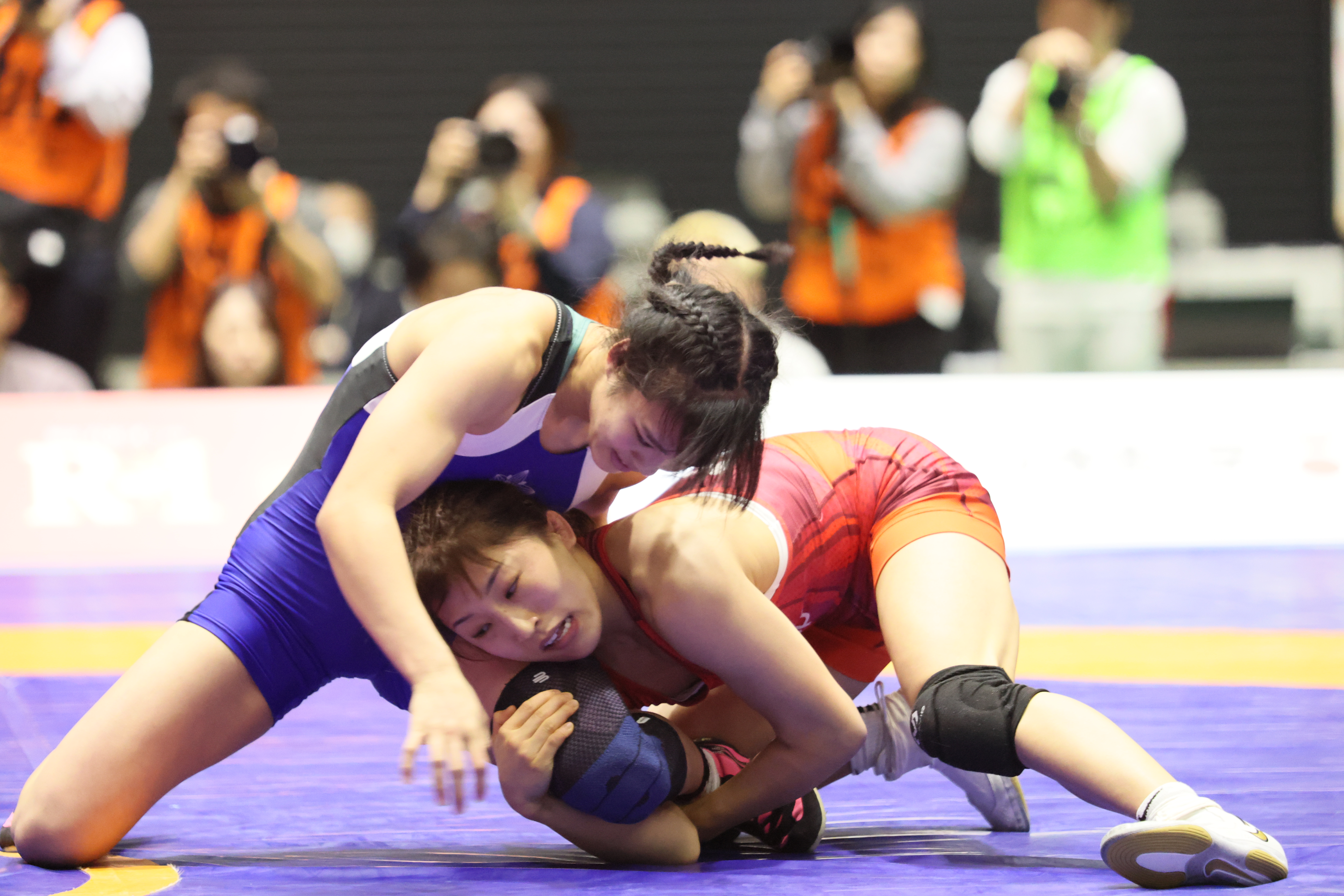 Yui SUSAKI shoots for a takedown against Haruna MORIKAWA in the women's 50kg final. (Photo: Takeo Yabuki / wrestling-spirits.jp)
Yui SUSAKI shoots for a takedown against Haruna MORIKAWA in the women's 50kg final. (Photo: Takeo Yabuki / wrestling-spirits.jp)
Share your thoughts.
Comments